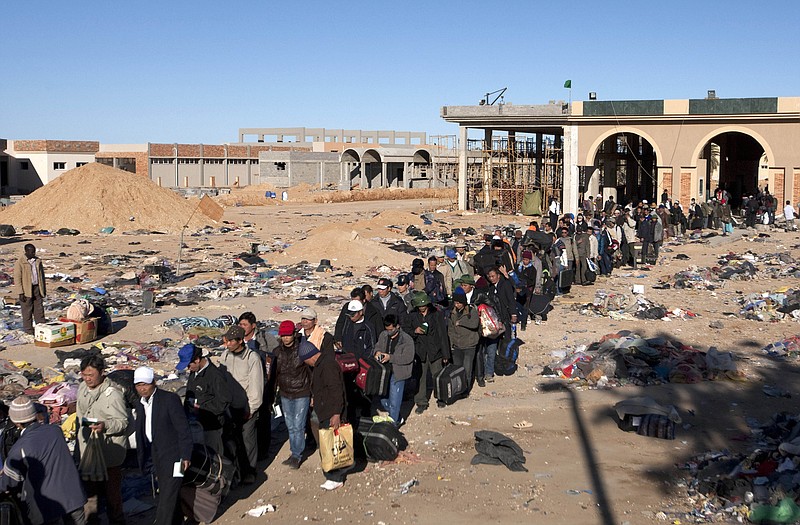BREGA, Libya (AP) - Rebel forces routed troops loyal to Moammar Gadhafi in a fierce battle over an oil port Wednesday, scrambling over the dunes of a Mediterranean beach through shelling and an airstrike to corner their attackers. While they thwarted the regime's first counteroffensive in eastern Libya, opposition leaders still pleaded for outside airstrikes to help them oust the longtime leader.
The attack on Brega, a strategic oil facility 460 miles east of Gadhafi's stronghold in Tripoli, illustrated the deep difficulties the Libyan leader's armed forces - an array of militiamen, mercenaries and military units - have had in rolling back the uprising that has swept over the entire eastern half of Libya since Feb. 15.
In the capital of Tripoli, Gadhafi warned against U.S. or other Western intervention, vowing to turn Libya into "another Vietnam," and saying any foreign troops coming into his country "will be entering hell and they will drown in blood."
At least 10 anti-Gadhafi fighters were killed and 18 wounded in the battle for Brega, Libya's second- largest petroleum facility, which the opposition has held since last week. Citizen militias flowed in from a nearby city and from the opposition stronghold of Benghazi hours away to reinforce the defense, finally repelling the regime loyalists.
The attack began just after dawn, when several hundred pro-Gadhafi forces in 50 trucks and SUVs mounted with machine guns descended on the port, driving out a small opposition contingent and seizing control of the oil facilities, port and airstrip. But by afternoon, they had lost it all and had retreated to a university campus 5 miles away.
There, opposition fighters besieged them, clambering from the beach up a hill to the campus as mortars and heavy machine gun fire blasted around them, according to an Associated Press reporter at the scene. They took cover behind grassy dunes, firing back with assault rifles, machine guns and grenade launchers. At one point, a warplane struck in the dunes to try to disperse them, but it caused no casualties and the siege continued.
For the past week, pro-Gadhafi forces have been focusing on the west, securing Tripoli and trying to take back nearby rebel-held cities. But the regime has seemed to struggle to bring an overwhelming force to bear against cities largely defended by local residents using weapons looted from storehouses and backed by allied army units.
In Benghazi, Libya's second-largest city and the stronghold of the rebellion in the east, a self-declared "interim government council" formed by the opposition called on foreign nations to carry out airstrikes on non-Libyan African mercenaries that Gadhafi has used in his militias to put down the uprising.
The council was announced Wednesday by opposition leaders, headed by Gadhafi's former Justice Minister Mustafa Abdel-Jalil, who joined the uprising.
The chaos in Libya - which has Africa's largest proven oil reserves - has sparked a major spike in world oil prices on worries the unrest will spread. Overall, crude production has dropped from 1.6 million barrels per day, nearly 2 percent of world consumption, to as little as 600,000 barrels per day. On Wednesday, oil prices rose near $102 per barrel, prices not seen since Sept. 2008.
The turmoil has also sparked a massive exodus of 180,000 people - mostly foreign workers in Libya - who have fled to the borders, U.N. refugee agency spokeswoman Melissa Fleming told the AP. European nations and Egypt launched emergency airlifts and sent ships to handle the chaotic crush.
Arabs consider a no-fly zone over Libya
Arab foreign ministers on Wednesday condemned Gadhafi's bloody crackdown on his own people, and said they would consider imposing a no-fly zone over the country in the turmoil continues.
The Arab ministers said they will coordinate their discussions about a no-fly zone with the African Union and consult "about the best ways to protect and ensure the safety and security of Libyan citizens." It was not clear when the Arab countries would make a final decision.
Some NATO countries, including the U.S. and Britain, are also drawing up contingency plans modeled on the no-fly zones over the Balkans in the 1990s in case the international community decides to impose an air embargo over Libya.

